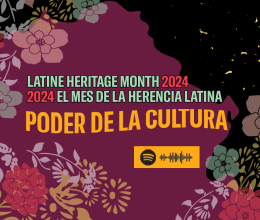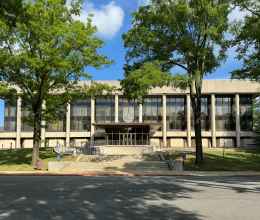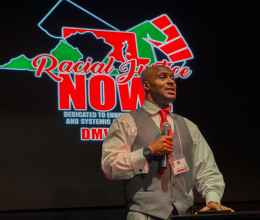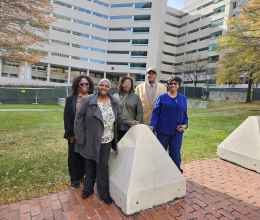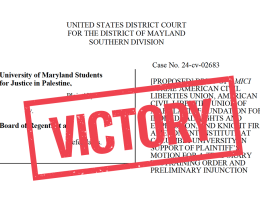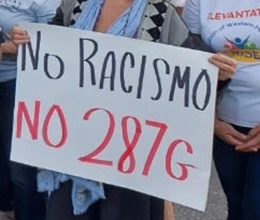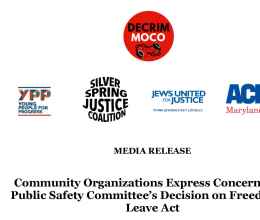
ACLU Files Two Lawsuits Challenging Gag Orders that Silence Victims of Police Abuse
Lawsuits Against Baltimore City and Salisbury Police Charge Free Speech, Government Secrecy Violations
BALTIMORE AND SALISBURY, MD - In a coordinated effort to take on "gag orders" that silence victims of police abuse as a condition of resolving their cases, the American Civil Liberties Union (ACLU) of Maryland today filed two separate lawsuits challenging the practice as an unconstitutional violation of free speech and illegal under Maryland's public transparency law. The cases were brought on behalf of a woman who was improperly denied half of her settlement award after responding to comments online about her experience of being brutalized by Baltimore police, as well as the Baltimore Brew and the Real News Network, two news organizations denied their First Amendment and statutory rights to obtain newsworthy public information from victims of police abuses.
"If your voice held no power, they would not try to silence you. Use your power. Speak up!" said Ashley Overbey, ACLU client in the Baltimore lawsuit. "I am not the first nor will I be the last to be mistreated by police and silenced by my city, but my hope is that through my story and fight, no one else will have to endure what so many of us already have."
"Free speech and police accountability to the communities they serve are both under attack when police departments block transparency and gag orders are used to silence victims of misconduct as a condition of settlement," said Deborah A. Jeon, Legal Director of the ACLU.
In 2012, Ashley Overbey, then a 25-year-old Black woman, called the Baltimore City Police Department for help, reporting a burglary at her apartment. Three sets of police officers were dispatched to her apartment at various times. The crime lab unit radioed for police officers to return and one of them, Officer Fred Hannah, forcefully entered and began searching her apartment without her permission. When Ms. Overbey asked him to explain he became violent and aggressive. Another officer, Martin Richardson, came soon after and together they beat, tackled, choked, Tased and handcuffed Ms. Overbey, who was transported to the hospital, then jailed for 24 hours, and charged with six counts of assault and one count of resisting arrest.
All charges against Ms. Overbey were dropped and she successfully sued the Baltimore Police Department for wrongful arrest and unwarranted physical abuse. But as a condition of settling the case, the city and police department required Ms. Overbey to agree to a gag order that silenced her from talking publicly about her experience. Ms. Overbey was victimized again by the police misconduct when half of her settlement was taken away just because she defended herself in comments on a blog where members of the public disparaged her personal character for suing the police and accepting a settlement, without any understanding of the level of excessive and illegal force used by the police. The Baltimore Police Department is punishing her by withholding half of her settlement amount for exercising her right to free speech.
"The city's lack of transparency has prevented us from doing our job - it has been very frustrating," said ACLU client Fern Shen, editor and publisher of The Baltimore Brew. "We and other reporters can't present a full and accurate picture of these police encounters if they are masked by bland, superficial summaries or worse, distorted by the fact that Baltimore City officials are permitted to comment but the citizen victims are penalized for doing so."
The second lawsuit stems from a 2014 case in which four Salisbury University students sued the city of Salisbury and one officer with the Salisbury Police Department (SPD), alleging police brutality, excessive force, illegal seizure, detention and arrest. The lawsuit also alleged that SPD personnel confiscated surveillance footage and creative fictional narratives to cover up what happened. In 2015, the court concluded that the plaintiffs sufficiently proved illegal patterns and practices by the SPD to allow the case to move forward. In 2016, the case was settled, but all details of the settlement, including the amount of the award, were withheld from the press and public. When the ACLU of Maryland and the Real News Network filed a Maryland Public Information Act request seeking documents about the settlement, the City rebuffed the request, claiming that neither it nor the SPD had any documentation regarding the settlement. This lack of transparency has caused at least one of the student plaintiffs to question whether SPD was holding its officers accountable for their actions, though he is silenced by the gag order that governs the settlement and risks losing his award if he speaks out.
"Covering policing on the Eastern Shore for The Real News has revealed there are significant problems with police transparency," said ACLU client Stephen Janis, investigative journalist for the Real News Network. "It is clear that the people in communities like Salisbury and Pocomoke both want and need to know what their police officers are doing and that includes critical information unreasonably withheld in these lawsuits."
Ashley Overbey and the Baltimore Brew are represented by Daniel Wolff, Benjamin Wastler, Nkechi Kanu, and Tyler O'Connor of Crowell & Moring LLP, as well as ACLU of Maryland Legal Director Deborah Jeon and Legal & Public Policy Counsel Nick Steiner.
The Real News Network is represented by Paul Kalish, Charles Austin, and Sara Helmers of Crowell & Moring LLP, as well as ACLU of Maryland Legal Director Deborah Jeon and Legal & Public Policy Counsel Nick Steiner.
###
